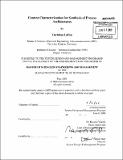Context characterization for synthesis of process architectures
Author(s)
LaFon, Christian (Christian Phillip)
DownloadFull printable version (32.70Mb)
Other Contributors
System Design and Management Program.
Advisor
Ricardo Valerdi.
Terms of use
Metadata
Show full item recordAbstract
Analysis steps are proposed as an aid for establishing Lean Product Development (LPD) activities in an organization. The proposal is offered as an aid to engineering managers and process designers for coping with the unique challenges of implementing processes from their inception - for example, at a new enterprise. As such, the thesis focuses on the creation of LPD, as opposed to traditional Lean improvement activities which benefit from the perspective of hindsight of a legacy process. Without established product development processes to improve upon, the implementation of product development activities at a new venture relies on the use of foresight to instance a LPD environment in new organizations. Therefore, the paper stresses stakeholder value delivery within the specific context that an enterprise operates and competes. A generic framework for context characterization is proposed and discussed. The framework is then evaluated for its usefulness in process design activities. The analysis steps are based on literature review and case study interviews. The proposed analysis steps include: * a comprehensive definition of the business context in which the enterprise operates and competes, * a statement of goals and objectives for the product development organization based on this context, and, * a determination of appropriate behaviors to meet these goals. Traditional Lean research has typically been approached from a large-scale, complex systems, for-profit perspective. (cont.) Unique insights are gained from the perspective of small, privately funded, new ventures. The benefits include foresight-only value objectives for product development (process creation) and uniqueness of context (i.e. resource limited, mindshare-driven). The analysis method was validated by examining process design case studies within three contexts: large-scale aerospace, industrial process monitoring, and high-technology start-up.
Description
Thesis (S.M.)--Massachusetts Institute of Technology, System Design and Management Program, 2008. Includes bibliographical references (leaves 115-118).
Date issued
2008Department
System Design and Management Program.Publisher
Massachusetts Institute of Technology
Keywords
System Design and Management Program.